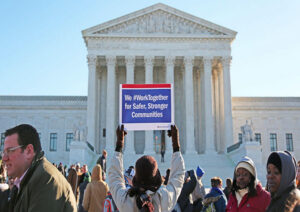
Source: CTA
Teachers
and other public employee union members rally outside the U.S. Supreme
Court, which heard oral arguments in Friedrichs v. the California
Teachers Association on Monday. The plaintiffs want the court to overturn a four-decades-old court decision in Abood v. Detroit Board of Education. That ruling said non-union employees don’t have to pay that portion of union dues that underwrites the union’s political activities, including the costs of backing candidates and lobbying governments on issues not related to working conditions and pay. But the court said that states could require all employees to pay “fair-share” or “agency” fees to cover costs related to negotiating working conditions and bread-and-butter pay matters, since the union represents members and non-members alike. In California, fair-share dues make up about 40 percent of a union member’s dues.
In their lawsuit, attorneys for the Friedrichs teachers argue there is no distinction between politicking and bargaining, because negotiating constitutes “political speech designed to influence governmental decision-making.” Rebecca Friedrichs, a veteran teacher in the Savanna School District in Anaheim, said she is forced to underwrite the union’s positions on tenure, layoffs and pensions with which she disagrees. Many fees-paying teachers “have moral beliefs and fiscal standards that place them on the exact opposite side of union politics,” she wrote in the Orange County Register.
Four of the court’s conservative justices had expressly invited a challenge to Abood in a related decision in 2014. In an ominous sign for unions, a fifth justice, Antonin Scalia, who had supported fair-share fees in an earlier decision, indicated Monday that he had changed his position.
“The problem is that everything that is collectively bargained with the government is within the political sphere, almost by definition,” including the decision by the government about whether to give pay increases, Scalia said.
Justice Anthony Kennedy said that mandatory dues “require that employees and teachers who disagree with those positions must nevertheless subsidize the union on those very points.”
In its brief, the State of California, which was named in the lawsuit, argued that it’s in the state’s interest as an employer to negotiate with one financially stable union representing workers’ interests.
The CTA and other public employee unions that filed briefs reiterated the court’s reasoning in Abood that mandatory fees prevent “free-riders” – workers who may be satisfied with the union but decide to save money by not contributing to it. Non-member teachers’ views are not suppressed by fair-share fees, they said.
“If we are going to have collective bargaining in the public sector, mandatory agency fees can serve important state interests without unduly burdening citizens’ speech,” California Solicitor General Edward C. DuMont told the justices Monday.
About 10 percent of the state’s teachers pay fair-share dues. But in Wisconsin, which eliminated the fair-share fees requirement in 2011, teachers union membership subsequently dropped 50 percent, the National Education Association reported last year.
The state argued that Friedrichs and the other plaintiffs never presented evidence that bargaining violated their political beliefs. Because the Friedrichs attorneys argued that Abood needed to be overturned for them to prevail, lower courts agreed to expedite their lawsuit without a trial.
The four liberal Supreme Court justices said there was no basis for overturning a four-decades-old decision that had been working well. Justice Stephen Breyer disagreed that mandatory contributions for representation in collective bargaining was not a core speech issue. Negotiating for wages, hours and working conditons is “pretty far removed from the heart of the First Amendment,” he said.
Unions have said that the teachers’ First Amendment argument is a ruse that’s part of conservative groups’ steady attack to weaken public employee unions’ influence and drain their treasuries.
CTA President Eric Heins, who attended today’s oral arguments, said that conservative justices’ antagonistic questions were expected but he didn’t conclude that the case was lost. Oral arguments are not a reliable prediction of a decision, he said.
The CTA has helped defeat three initiatives in the past 20 years that would have prevented unions from automatically collecting dues for political purposes. One of those initiatives, on the ballot in 2012, would have also banned contributions to political candidates.
“The Friedrichs lawsuit is an end-run around to the courts to try to win what opponents of unions have been unable to do at the ballot box,” Heins said.
- EdSource asked law professors and attorneys who have followed and written about Friedrichs v. California to share their perspectives on today’s oral arguments and how they may affect the outcome of the case. They are Deborah La Fetra, Principal Attorney, Pacific Legal Foundation; Charlotte Garden, Associate Professor, Seattle University School of Law; and William Gould IV, Emeritus Professor, Stanford Law School.


No comments:
Post a Comment